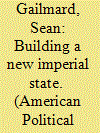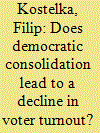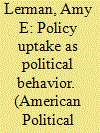|
|
|
Sort Order |
|
|
|
Items / Page
|
|
|
|
|
|
|
| Srl | Item |
| 1 |
ID:
156697


|
|
|
|
|
| Summary/Abstract |
Separation of powers existed in the British Empire of North America long before the U.S. Constitution of 1789, yet little is known about the strategic foundations of this institutional choice. In this article, I argue that separation of powers helps an imperial crown mitigate an agency problem with its colonial governor. Governors may extract more rents from colonial settlers than the imperial crown prefers. This lowers the Crown’s rents and inhibits economic development by settlers. Separation of powers within colonies allows settlers to restrain the governor’s rent extraction. If returns to settler investment are moderately high, this restraint is necessary for colonial economic development and ultimately benefits the Crown. Historical evidence from the American colonies and the first British Empire is consistent with the model. This article highlights the role of agency problems as a distinct factor in New World institutional development, and in a sovereign’s incentives to create liberal institutions.
|
|
|
|
|
|
|
|
|
|
|
|
|
|
|
|
| 2 |
ID:
156705


|
|
|
|
|
| Summary/Abstract |
Transfer and redistribution of wealth accompany most violent conflicts throughout the world, yet the local-level political and economic effects of this phenomenon remain unexplored. We address this omission by examining the long-term impact on the surrounding communities of the Nazi death camp Treblinka in Poland, where nearly a million Jews were murdered. The assets of murdered Jews sometimes ended up in the hands of the local population. We are able to identify the enduring impact of these property transfers on local economic and political outcomes because the exact location of Treblinka was exogenous to the characteristics of surrounding communities. We find that communities located closer to the camp experienced a real estate boom but do not exhibit higher levels of economic and social development. These communities also showed higher support for an anti-Semitic party, the League of Polish Families. Our findings speak to an important but overlooked challenge to post-conflict reconstruction and reconciliation.
|
|
|
|
|
|
|
|
|
|
|
|
|
|
|
|
| 3 |
ID:
156701


|
|
|
|
|
| Summary/Abstract |
In recent years, a number of scholars have taken parties and partisanship as objects of normative theorizing. They posit partisanship as a fundamentally democratic practice and develop a model of what partisans can do at their best to contribute to liberal democracy. However, the standards the literature puts forth remain insufficiently specified to serve as empirical benchmarks. This article further conceptualizes this model of democratic partisanship and offers a theoretical framework within which to empirically evaluate the democratic merits of partisan discourses. It establishes a series of indicators for assessing the extent to which partisan discourse displays two main qualities: cohesiveness and respect for political pluralism. The article then discusses the implications of using this theoretical framework as a basis for empirical studies and shows how the model can thereby benefit both political scientists and theorists.
|
|
|
|
|
|
|
|
|
|
|
|
|
|
|
|
| 4 |
ID:
156703


|
|
|
|
|
| Summary/Abstract |
To paint a fuller picture of economic voters, we combine personal income records with a representative election survey. We examine three central topics in the economic voting literature: pocketbook versus sociotropic voting, the effects of partisanship on economic evaluations, and voter myopia. First, we show that voters who appear in survey data to be voting based on the national economy are, in fact, voting equally on the basis of their personal financial conditions. Second, there is strong evidence of both partisan bias and economic information in economic evaluations, but personal economic data is required to separate the two. Third, although in experiments and aggregate historical data recent economic conditions appear to drive vote choice, we find no evidence of myopia when we examine actual personal economic data.
|
|
|
|
|
|
|
|
|
|
|
|
|
|
|
|
| 5 |
ID:
156696


|
|
|
|
|
| Summary/Abstract |
This article challenges the conventional wisdom that democratic consolidation depresses voter turnout. Studying democratic legislative elections held worldwide between 1939 and 2015, it explains why voting rates in new democracies decrease when they do, how much they decrease, and how this phenomenon relates to the voter decline observed in established democracies. The article identifies three main sources of decline. The first and most important is the democratization context. When democratizations are opposition-driven or occur in electorally mobilized dictatorships, voter turnout is strongly boosted in the founding democratic elections. As time passes and the mobilizing democratization context loses salience, voting rates return to normal, which translates into turnout declines. The second source is the democratic consolidation context, which seems to depress voter turnout only in post-Communist democracies. Finally, new democracies mirror established democracies in that their voting rates have been declining since the 1970s, irrespective of the two previous mechanisms.
|
|
|
|
|
|
|
|
|
|
|
|
|
|
|
|
| 6 |
ID:
156706


|
|
|
|
|
| Summary/Abstract |
This article offers a new interpretation of Kant's cosmopolitanism and his anti-colonialism in Toward Perpetual Peace. Kant's changing position has been the subject of extensive debates that have, however, not recognized the central place of colonialism in the political, economic, and military debates in Europe in Kant's writings. Based on historical evidence not previously considered alongside Perpetual Peace, I suggest that Kant's leading concern at the time of writing is the negative effect of European expansionism and intra-European rivalry over colonial possessions on the possibility of peace in Europe. Because of the lack of affinity between colonial conflict and his philosophy of history, Kant must adjust his concept of antagonism to distinguish between war between particular dyads, in particular spaces, and with particular non-state actors. I examine the implications of this argument for Kant's system of Right and conclude that his anti-colonialism co-exists with hierarchical views of race.
|
|
|
|
|
|
|
|
|
|
|
|
|
|
|
|
| 7 |
ID:
156707


|
|
|
|
|
| Summary/Abstract |
Scholars are increasingly utilizing online workforces to encode latent political concepts embedded in written or spoken records. In this letter, we build on past efforts by developing and validating a crowdsourced pairwise comparison framework for encoding political texts that combines the human ability to understand natural language with the ability of computers to aggregate data into reliable measures while ameliorating concerns about the biases and unreliability of non-expert human coders. We validate the method with advertisements for U.S. Senate candidates and with State Department reports on human rights. The framework we present is very general, and we provide free software to help applied researchers interact easily with online workforces to extract meaningful measures from texts.
|
|
|
|
|
|
|
|
|
|
|
|
|
|
|
|
| 8 |
ID:
156704


|
|
|
|
|
| Summary/Abstract |
The trial and execution of Louis XVI served as a founding act of French republican democracy. It was also a scene of irregular justice: no legal warrants or procedural precedents existed for bringing a king to justice before the law. This essay describes how Jacobins crafted a new language of popular agency to overcome that obstacle—the language of redemptive violence. Although redemptive violence had roots in prerevolutionary notions of penal justice and social cohesion, its philosophical ambitions were revolutionary and modern. Analyzing that language illuminates how republican democracy weaponized a distinctive ideology of extralegal violence at its origins. It also helps explain redemptive violence's enduring appeal during and after the French Revolution.
|
|
|
|
|
|
|
|
|
|
|
|
|
|
|
|
| 9 |
ID:
156702


|
|
|
|
|
| Summary/Abstract |
Partisanship is a primary predictor of attitudes toward public policy. However, we do not yet know whether party similarly plays a role in shaping public policy behavior, such as whether to apply for government benefits or take advantage of public services. While existing research has identified numerous factors that increase policy uptake, the role of politics has been almost entirely overlooked. In this paper, we examine the case of the Affordable Care Act to assess whether policy uptake is not only about information and incentives; but also about politics. Using longitudinal data, we find that Republicans have been less likely than Democrats to enroll in an insurance plan through state or federal exchanges, all else equal. Employing a large-scale field experiment, we then show that de-emphasizing the role of government (and highlighting the market's role) can close this partisan gap.
|
|
|
|
|
|
|
|
|
|
|
|
|
|
|
|
| 10 |
ID:
156699


|
|
|
|
|
| Summary/Abstract |
Development projects like schools and latrines are popular with politicians and voters alike, yet many developing countries are littered with half-finished projects that were abandoned mid-construction. Using an original database of over 14,000 small development projects in Ghana, I estimate that one-third of projects that start are never completed, consuming nearly one-fifth of all local government investment. I develop a theory of project noncompletion as the outcome of a dynamically inconsistent collective choice process among political actors facing commitment problems in contexts of limited resources. I find evidence consistent with key predictions of this theory, but inconsistent with alternative explanations based on corruption or clientelism. I show that fiscal institutions can increase completion rates by mitigating the operational consequences of these collective choice failures. These findings have theoretical and methodological implications for distributive politics, the design of intergovernmental transfers and aid, and the development of state capacity.
|
|
|
|
|
|
|
|
|
|
|
|
|
|
|
|
| 11 |
ID:
156695


|
|
|
|
|
| Summary/Abstract |
A large literature expects rising middle classes to promote democracy. However, few studies provide direct evidence on this group in nondemocratic settings. This article focuses on politically important differentiation within the middle classes, arguing that middle-class growth in state-dependent sectors weakens potential coalitions in support of democratization. I test this argument using surveys conducted at mass demonstrations in Russia and detailed population data. I also present a new approach to studying protest based on case-control methods from epidemiology. The results reveal that state-sector professionals were significantly less likely to mobilize against electoral fraud, even after controlling for ideology. If this group had participated at the same rate as middle-class professionals from the private sector, I estimate that another 90,000 protesters would have taken to the streets. I trace these patterns of participation to the interaction of individual resources and selective incentives. These findings have implications for authoritarian stability and democratic transitions.
|
|
|
|
|
|
|
|
|
|
|
|
|
|
|
|
| 12 |
ID:
156698


|
|
|
|
|
| Summary/Abstract |
Democracy is often fragile, especially in states recovering from civil conflict. To protect emerging democracies, many scholars and practitioners recommend political powersharing institutions, which aim to safeguard minority group interests. Yet there is little empirical research on whether powersharing promotes democratic survival, and some concern that it limits electoral accountability. To fill this gap, we differentiate between inclusive, dispersive, and constraining powersharing institutions and analyze their effects on democratic survival from 1975 to 2015 using a global dataset. We find sharp distinctions across types of powersharing and political context. Inclusive powersharing, such as ethnic quotas, promotes democratic survival only in post-conflict settings. In contrast, dispersive institutions such as federalism tend to destabilize post-conflict democracies. Only constraining powersharing consistently facilitates democratic survival regardless of recent conflict. Institution-builders and international organizations should therefore prioritize institutions that constrain leaders, including independent judiciaries, civilian control of the armed forces, and constitutional protections of individual and group rights.
|
|
|
|
|
|
|
|
|
|
|
|
|
|
|
|
| 13 |
ID:
156700


|
|
|
|
|
| Summary/Abstract |
This article evaluates Jürgen Habermas's attempt to reopen political liberalism to religion. In trying to “take religion seriously,” Habermas goes further than John Rawls and other liberal theorists by affirming that religious traditions articulate truths on which democratic societies continue to depend for their civic and moral health. “Post-secular” societies, in his view, should learn from religion by translating its “moral intuitions” into universal secular language. Although Habermas in this way appears friendlier to religion than Rawls, unlike Rawls he also calls for the “modernization of religious consciousness.” This theological transformation not only reveals the foundationalist presuppositions of liberalism, but also points to a highly attenuated conception of learning from religion. Taking religion seriously will require us to be open to its insights not only when they agree with, but especially when they challenge, our secular presuppositions. This dimension of religion is at risk of getting “lost in translation” in the Habermasian paradigm.
|
|
|
|
|
|
|
|
|
|
|
|
|
|
|
|
|
|
|
|
|